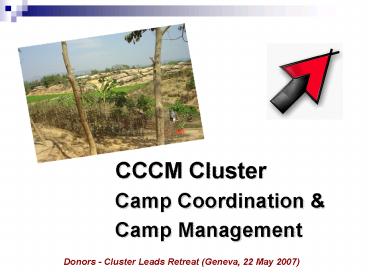CCCM Cluster - PowerPoint PPT Presentation
1 / 17
Title: CCCM Cluster
1
CCCM Cluster Camp Coordination Camp Management
Donors - Cluster Leads Retreat (Geneva, 22 May
2007)
2
Cluster Partners at the Global Level
- Regular
- UNHCR and IOM (co-chairs)
- CARE International
- Danish Refugee Council (DRC)
- International Rescue Committee (IRC)
- Lutheran World Federation (LWF)
- Norwegian Refugee Council (NRC)
- Shelter Centre
- WFP
- United Nations Environmental Programme (UNEP)
- OCHA
- Occasionally
- UNRWA, ICRC, IFRC, OHCHR, UNICEF
3
Camp Coordination Camp Management
- what is that about?
4
The CCCM cluster was set up in 2005 as a result
of the Humanitarian Response Review
'HARDWARE' Technical standards and guidelines are
not part of CCCM
'SOFTWARE' CCCM deals with the know how, the
people and organizational aspects of
establishing, running and closing of camps.
5
Main Goals of CCCM are
- Improve living conditions, assistance to and
protection of IDPs living in camps. - Effective common policy framework guiding
humanitarian actors. - Consistency and common standards applied in all
camps. - Secure humanitarian space and unhindered access
for delivery of humanitarian services. - Show added value of CCCM as a key sector which is
resourced with adequate staff and funding. - Ensure involvement of residents in camp
governance structures. - Mainstreaming of cross-cutting issues.
6
Roles and Responsibilities
- Camp Administration RR of
- national authorities at camp and
- inter-camp level
- Camp Coordination RR of cluster
- lead at inter-camp level
- 3. Camp Management RR of NGOs
- at individual camp level
7
The levels of intervention
- GLOBAL
- Standards/policy-setting.
- Building response capacity.
- Operational support.
- NATIONAL
- Support/development of national strategies and
plans - FIELD / REGIONAL
- Coordination of multiple camps
- IN ONE CAMP
- Management of a single camp
8
Global Cluster Lead Responsibilities
- Standards and Policy-Setting
- Building Response Capacity
- Operational Support
9
1. CCCM - Policy Setting
- CCCM Framework (in English and French)
- CD Rom/Database 'IDP Key Resources' with
linkage from Humanitarian Reform website
www.humanitarianreform.org - Studies/ 'Best practice' collective centres and
camp management/co-ordination - Camp Management Toolkit www.nrc.no/camp
- IASC Gender Handbook CCCM chapter
- IASC Guidelines on IDP Profiling
- Needs Analysis Framework (NAF) CCCM section
10
2. Training and Capacity Building
- Common Profile of Camp Co-ordinators and Camp
Managers - A roster of trainers to facilitate training on
CCCM - CCCM training offered to field personnel at 3
levels - regional workshops and country specific
trainings for - personnel of CCCM partner agencies
- Two ToT workshops in Addis Abeba and Manila for
40 new trainers - from 9 different NGOs, UN agencies and IOs.
- Eight CCCM trainings in Oslo, Bamako, Kordofan
(Sudan), Panama City, - Cairo, Amman (for Iraq), Gulu and Lira (Uganda)
resulting in over 250 - staff trainer, representing more than 25 NGOs,
UN agencies and IOs.
11
3. CCCM Operational Support
- Deployment of IDP profiling experts
- NRC/DRC Somalia, UNHCR Chad, Cote d'Ivoire
- Deployment of Information Management experts
- UNHCR Somalia (Population Tracking), Myanmar,
Uganda CartONG responsible for camp database
mapping of camps - UNGIWG WFP/OCHA for data standards setting
- IOM Ethiopia and Uganda
- Deployment of CCCM experts to Somalia, Darfur,
Timor Leste, Philippines, Madagascar, Yogyakarta - Support was also given to camp closure
situations such as Liberia and for assessments in
Uganda
12
CCCM Response in the Field
- Liberia
- Uganda
- Pakistan
- Philippines
- Mozambique
- Ethiopia
- Madagascar
- Darfur
- Timor Leste
- Chad
- Somalia
- DRC (up-coming)
13
- Main Partners at the Field Level
- The partners involved in humanitarian response
- for IDPs hosted in camps or camp-like settlements
are - Main partners at global level
- Governments/local authorities
- Displaced persons through IDP camp leaders,
- representatives or camp committees
- NGO service providers working in IDP camps
- Other stakeholders host communities, community
based organisations (CBOs), donors
14
CCCM focus in 2007-08
- Develop joint needs assessment, monitoring and
- evaluation, standards and indicators for the
cluster. - Update 2005 capacity mapping exercise.
- Mainstream cross-cutting issues (HIV/AIDS,
- environment, gender etc) in CCCM activities.
- Develop and disseminate 'best practice' on CCCM.
- Strengthen CCCM training at national, regional
and - global levels.
- Strengthen information management on protection/
- welfare situation and humanitarian services in
camps. - Pilot protection incident software in camp
environment - Develop generic IT tool based on Uganda project
15
CCCM Specificities in UNHCR IOM
There is no UNHCR or IOM specific CCCM training.
All CCCM training is organized by the cluster.
There is no UNHCR or IOM specific IDP profiling
policy or practice. All related activities are
taking place at the inter-agency level.
16
- The Global CCCM Cluster working group adopted an
agreed workplan for 2007/2008 - A priority list will come into play if there is
less than 100 funding - All cluster members agreed to pooled funding
through UNHCR - Monitoring of activities is not the task of the
co-chairs but a collective responsibility of the
cluster working group - UNHCR and IOM are operating a "joint / virtual
secretariat" for day-to-day follow-up of
activities
Work Plan Pooled Funding Monitoring Priorities Sec
retariat
17
Thank you for your attention.































